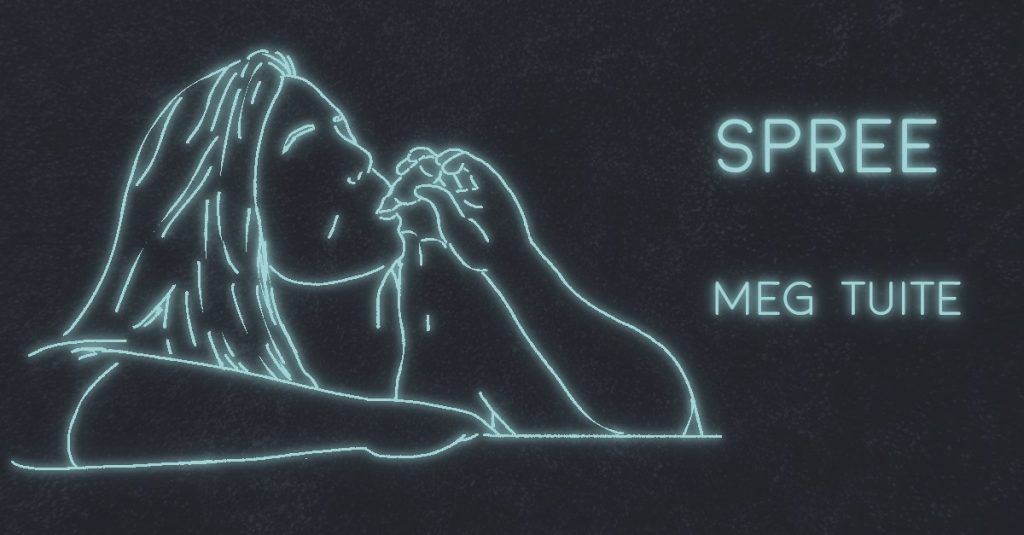Mom has an entire fortress of pillows that she readjusts around her body.
“Barricading my skin against bedsores. Stay in one place for too long and you’ll have to order another ass from Walgreens.” Amber prescription bottles layer her bedside table. She marks the empties with a black X, doesn’t throw them away until a refill has been secured.
Rustling toes mow through bed sheets as Mom drags up another mini-vodka with her feet. The bottomless cascade of that clear liquid is her Niagara Falls. She is queen of the mini-island. Bottles are stashed away in pockets, beds, pillows, shoes, drawers, seat cushions. She buys tiny airplane-size bottles and layers the counter with them at the Walgreens every Monday, Tuesday, Wednesday, and Thursday.
“I’m not a weekender,” she tells the clerk. “The Friday cattle who line up here are absurd, like accountants and flags.” No matter who’s behind the register, Mom is told that the larger bottles are much cheaper. She’s not an idiot. She loads up her empty purse with them, holds her hand up to her mouth as though it’s a secret and whispers to the clerk, “Hide the evidence. You get it, right?” Every time they laugh as though this is some kind of code that every customer, whether living in a cardboard box or a three-story house with kids doesn’t access.
“Elvirus, I’ve been calling you,” she says, as though I can’t hear the wheels of her guttural, somnolent chant, rutting over and over in my head.
“We’re going shopping. Light Mom a cigarette and get her a glass of ice for her vodka.” She doesn’t call me by my chosen name and speaks in third person after a few drinks. “Don’t forget her lemon, Elvine,” she thrums through a bloom of smoke.
By the time I get back with her glass, she’s dressed in one of her slinky 70s dresses.
This mimicry exhibits all the features of someone’s mom, but not mine. My mom only goes out for liquor. Her hair is combed. She isn’t wearing her shredding nylon nightgown, with coffee-splotched stains and cigarette holes anymore.
I stare in the mirror. I still look like her kid. My bangs are crooked and I wear stagnant knock-offs with shoulder pads, budding breasts polyp through Mom’s darts, pleated jean skirts and shiny pink, green and red blouses with moving motifs of lava lamp patterns, fringe and bell-bottoms from the pioneer days of Mom’s closet. I have a gift for reassembling the backwash material with scissors and safety pins.
“Do we need to lock the door?” Mom searches her purse for a key she doesn’t possess, as we walk out into infested air, thick with all the lives before it.
Mom and I slog through Harwood Avenue to catch a bus five blocks away. She wavers on a slight incline with her head and upper torso two steps ahead of the rest of her. She doesn’t drive anymore. I was eleven when I drove us home after Mom had one of her panic attacks, slammed over a curb into the yard of someone’s rummage sale. She didn’t hit anybody, but faces unhinged from the broken-down armoire, bicycles, toolsets, clothes, toys and astrology books they’d been rummaging through.
Mom’s hands were claws. Too much white hovered around the persecuted gray of her eyes. I had to unclench her fingers from the steering wheel and sit on top of her. When we got home, she shut the door to her room and didn’t come out for a few days. Dad whispered, ‘menopause’, but I knew this was no kind of pause.
We got off the bus in front of the “old bag” second-hand store.
“These clothes are married to a history you can feel. They didn’t come from cheap labor in China. Check the labels,” Mom says.
I’m fourteen, don’t check labels. I rake through racks to find something normal that will fit me. Some lady with a skin-rippled overlip keeps threading silent eye-pong accusations in my direction as she folds sweaters and talks to the woman behind the counter. They have the exact same haircut. “A mutt is a mutt,” she says. “You don’t have any idea what you’re getting. You remember that guy who had the same mutt for like ten years and they find him mauled in his backyard. I mean, that’s the chance you take when you go to one of those shelters. With a pedigree, you can check out the parents of the litter and know what you’re bringing home.” The other lady looked bored like she’d heard this shit before. Overlip glanced over at me. “You can only take six items in the dressing room, honey. Six.” She held up six ringed fingers.
Mom was already in a dressing room. I could see the maxi dresses looped over the door. It was either nightgowns or slinky dresses and I loved when she dressed up even when she wasn’t going anywhere. That meant Mom was back in the world with us.
This place wasn’t an easy score. The women were checking my every move. “Here, honey, let me help you. What size are you? Six?” So much for a free one. Mom never helped. She wasn’t the Mom who talked with women. She could care less what transpired between us. Her universe placated one being. Mom bought me a pair of jeans and some sandals and said yes to all the dresses. After we got back on the bus walked the few blocks to get home, Mom unzipped the dress she was wearing and had two more on underneath. She ripped them off. “That feels much better. I was getting hot. Honey, can you get me a few lemons?”
“You stole those dresses?”
“No one else could have pulled these dresses off, Elvatross, let’s be definitive. I was saving the ladies a few hangers.”

